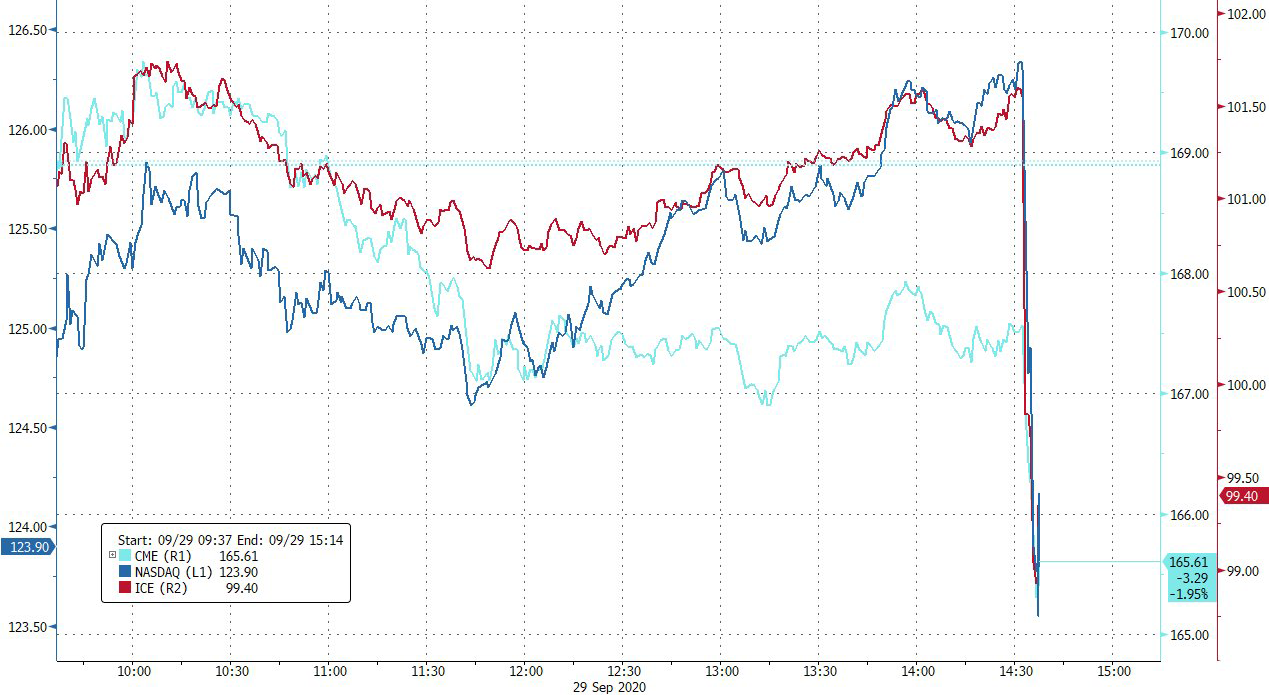Trump’s Anti-Trust “Cop” Targets Wall Street’s Data Pricing In Blow To Exchanges
Tyler Durden
Tue, 09/29/2020 – 14:55
Until now, practically all of the leaks about the anti-trust group gestating inside the DoJ and FTC have focused on big tech. But in an unexpected pivot, Bloomberg just reported that regulators are investigating the different data pricing packages sold by the exchanges to wire services like Bloomberg – along with High Frequency Traders who use the data to employ HFT strategies that rack up steady profits by inserting the “market makers” in between more trades.
Makan Delrahim, who heads the Justice Department’s antitrust division, said in an interview that he’s paying close attention to the data that securities exchanges sell to banks and investment companies. Market participants have long complained that the prices they pay to acquire the data they depend on to trade are too steep.
Delrahim said that one area of potential concern is whether the exchanges are using market power to hurt competition, for example by forcing investors to buy other products or services in addition to the data feeds, a practice known as tying. He declined to comment on whether the division has opened a formal investigation related to the data feeds.
Bloomberg reported that Bloomberg News (one of the subsidiaries of Bloomberg LP) is among the companies that have contested increases in pricing for the different packages offered by the exchanges.
In recent years, the business models of the world’s financial exchanges, which facilitate trading in financial markets from stocks to commodity futures, has pivoted to rely more on these lucrative data subscriptions, and less on the actual trading fees, which have been squeezed by years of consolidation and intensifying competition. And in a world where every nanosecond of frontrunning the orderflow data latency matters, exchanges can charge an arm and a leg, and there will always be a highest HFT bidder willing to pay the price if it means guaranteed and legal “information arbitrage.”
The financial market data peddled by these exchanges provides the world with the view of the financial markets reflected everywhere from CNBC to Google Finance to the Bloomberg terminals and Reuters Eikon platforms used by financial professionals. Of course, different pricing arrangements provide different data with varying levels of delay.
Shares of exchange operators ICE, CME and Nasdaq all tumbled on the news (note: ICE owns the NYSE):
According to Bloomberg, it’s not the only party that has “long griped” about these high prices for financial data. So have Wall Street banks (though mostly because Bloomberg passes on these charges to customers).
As it turns out, an updated draft of the Bloomberg story revealed that their source was none other than Makan Delrahim, the new head of the DoJ’s antitrust division, which is working with the FTC to investigate anti-trust abuses by Big Tech. However, in the interview, Delrahim confirmed that “I want to make sure that, if there’s anticompetitive conduct on Wall Street, that we pursue it.”
In an aside that could create headaches for the banks someday, Delrahim said he is also interested in revamping the code surrounding bank mergers.
But when it comes to the exchanges, Delrahim said an area of potential concern is whether they illegally force customers to buy additional, unnecessary products or services, a strategy known as “tying”. Last year, SEC Chairman Jay Clayton, the same man who let Elon Musk mock the federal government then walk away with a slap on the wrist, told the agency to start looking into potential abuses, as the agency clashed with the major exchange operators, including ICE. Clayton was apparently concerned that the rules had created a “two-tiered system”, where firms must pay exchanges for the private information just to be competitive. In May, the agency ordered the exchanges to improve the quality of public data feeds to try and reduce the market’s dependence on the private feeds. Ultimately, the standard that Clayton and Delrahim seem to be hinting at is whether firms are forced to pay exhorbitant sums just to get the data they need to be competitive. However, Delrahim declined to say whether an official investigation had actually been launched.
via ZeroHedge News https://ift.tt/2GicJwQ Tyler Durden
